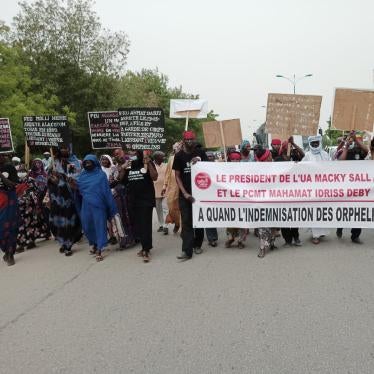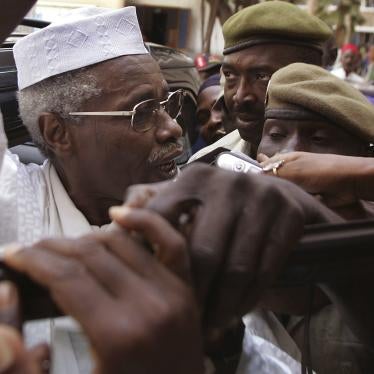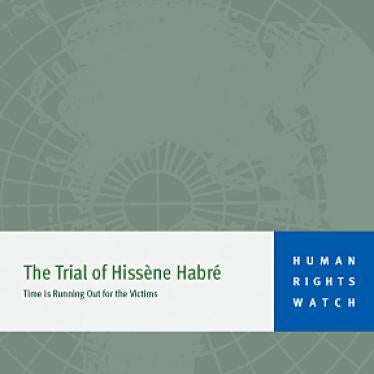N'Djaména, Chad -- Ten years ago, I went to Senegal with Samuel Togoto and Sabadet Totodet, two Chadians who survived brutal torture at the hands of the dictatorial regime of Hissène Habré. Habré had taken refuge in Senegal in 1990 and, inspired by the London arrest of the former Chilean strongman Augusto Pinochet, his victims came after him seeking justice.
Togoto walked with a severe limp from the "arbatachar" torture, in which a prisoner's hands and feet are tightly bound together behind his back, causing a loss of circulation. Totodet was still traumatized by his job as the jail's "gravedigger," dumping hundreds of his fellow prisoners into mass graves. But they were dignified and hopeful when they told their story to a young Senegalese judge. And they were ecstatic when, on February 3, 2000, the judge indicted Habré on charges of torture and crimes against humanity and placed him under house arrest.
Ten years later, Togoto and Totodet are dead and Senegal has yet to bring Hissène Habré to trial.
After Abdoulaye Wade was elected president of Senegal, a commission he presided over threw the indicting judge off the Habré case and the charges were dismissed on a technicality, provoking protests from the United Nations. Togoto and Totodet did not give up, however. They and other victims, including several who had taken up exile in Belgium, pressed charges against Habré in that country, whose famous "universal jurisdiction" law allowed its courts to hear foreign atrocity cases. A Belgian judge went to Chad, where he and a police team visited Habré's former prisons and mass graves. Witnesses lined up to tell their stories.
I made frequent trips to Chad to build the case. In 2001, I stumbled onto the abandoned archives of Habré's personal Gestapo, the feared "DDS." Tens of thousands of documents strewn on the floor detailed how Habré had placed the DDS under his direct control, attacked rival ethnic groups and organized the repression of political opponents. A report on the documents released last week by the Human Rights Data Analysis Group of the Benetech Initiative found "a clear communication and command link" between Habré and the DDS and showed that Habré received 1,265 direct communications from the DDS about the status of 898 detainees. The documents listed 1,208 dead prisoners, confirming what victims told me -- that most of those who entered Habré's dungeons, including one at the presidential compound, never came out alive.
Sabadet Totodet, his life ruined by years in prison, died from drinking in 2002. Samuel Togoto died from gangrene in 2004, a direct result of his torture. But other survivors carried on.
In 2005, the Belgian judge issued an international arrest warrant against Habré. But rather than order Habré's extradition, President Wade referred the case to the African Union, which, in July 2006, called on Senegal to prosecute Habré "on behalf of Africa." President Wade declared that Senegal would finally do so.
Three and a half years later, however, Senegal has not even begun to prepare the trial. Habré has reportedly used some of the millions he stole from Chad's treasury to build himself a wall of protection in Senegal. President Wade says that no action against Habré will be taken until Senegal receives $40 million up front from the international community for anticipated trial costs. The European Union and countries like France, Belgium, the Netherlands and Switzerland, have said that they are ready to finance the trial, but want Senegal to put forward a "credible" budget. While discussions drag on, more and more survivors die. In unprecedented move last February, Belgium filed suit against Senegal at the International Court of Justice to try to force Senegal into action.
Last year, after the International Criminal Court issued an arrest warrant against President Omar al-Bashir of Sudan for alleged war crimes and crimes against humanity committed in Darfur, African Union leaders claimed that the ICC was picking on Africa. The real problem, however, is that justice in Africa has proven powerless in the face of the crimes committed by African rulers.
A fair trial for Hissene Habré would strike a blow against the cycle of impunity in which leaders brutalize their countries, pillage their treasuries and then when their time is up move next door to join their bank accounts. It would also be a precedent to show that African courts can deliver justice for crimes committed in Africa - as long as there are survivors left at the trial.







